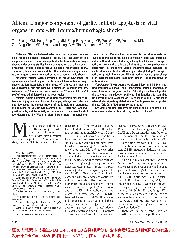摘要
Objective: Allicin is believed to be the main component responsible for the biological activity of garlic. The regulation of cell apoptosis may have therapeutic potential for trauma/hemorrhagic shock, and previous studies have demonstrated that allicin exerts protective effects against tissue ischemia-reperfusion injury. Therefore, this study examined the effects of allicin on apoptosis-related organ damage, induced by trauma/hemorrhagic shock. @@@ Methods: Studies were performed on an in vivo model of spontaneously breathing rats with induced trauma/hemorrhagic shock; the left lower lobe of the lungs, left kidney, and intestine were resected, and the rats were subjected to femur fracture, ischemia for 30 mins, and reperfusion for 20 mins. Allicin (30 mu g/kg) was administered during reperfusion. @@@ Results: Allicin administered during reperfusion markedly attenuated injury and apoptosis of the lungs, kidneys, and intestine and decreased the concentrations of lactic acid and creatinine, the number of in situ TdT-mediated dUTP nick-end labeling-positive cells, and the activity and expression of caspase-3 and -9 (as determined by Western blot). Furthermore, immunohisto-chemistry and Western blot performed 24 hrs after reperfusion revealed increases in the levels of nuclear factor kappa B, phosphorylated p38, and extracellular signal-regulated kinase 1 mitogen-activated protein kinase in the allicin-untreated group when compared with the sham rats. Allicin treatment downregulated the levels of nuclear factor kappa B and phosphorylated p38 mitogen-activated protein kinase but did not modify those of phosphorylated extracellular signal-regulated kinase 1 mitogen-activated protein kinase. @@@ Conclusion: Allicin attenuates tissue injury and inhibits trauma/hemorrhagic shock- and reperfusion-induced apoptosis in several important organs via the p38 mitogen-activated protein kinase signal transduction pathway that functions to stimulate the activation of nuclear factor-kappa B, caspase-3 and -9, but not of extracellular signal-regulated kinase 1 mitogen-activated protein kinase. (Crit Care Med 2008; 36:3226-3232)
- 出版日期2008-12
- 单位浙江大学
